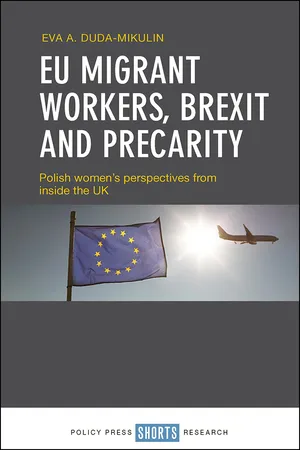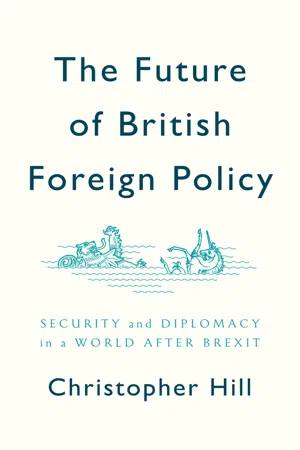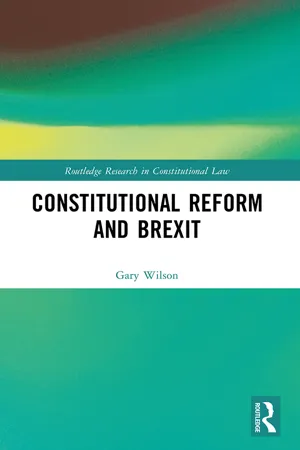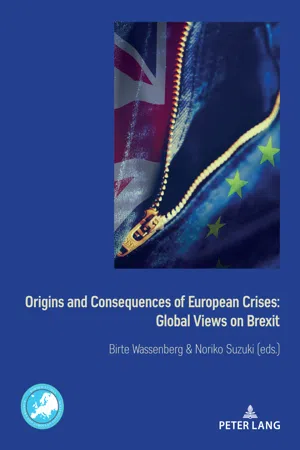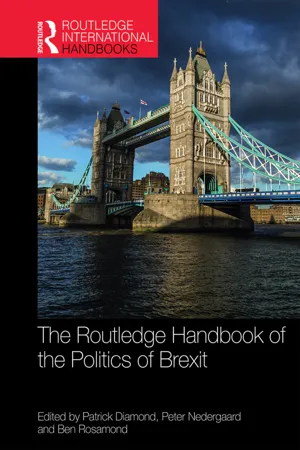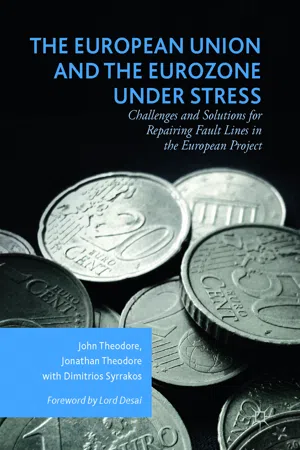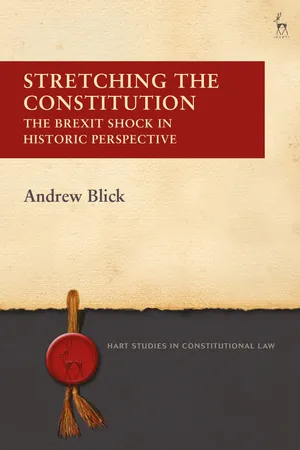Politics & International Relations
Brexit
Brexit refers to the United Kingdom's decision to leave the European Union, following a 2016 referendum in which a majority of British voters supported the move. The process of Brexit has involved complex negotiations between the UK and the EU to determine the terms of their future relationship, including trade, immigration, and security arrangements. The decision has had significant political, economic, and social implications for both the UK and the EU.
Written by Perlego with AI-assistance
Related key terms
1 of 5
7 Key excerpts on "Brexit"
- eBook - ePub
EU Migrant Workers, Brexit and Precarity
Polish Women's Perspectives from Inside the UK
- Eva A. Duda-Mikulin, Duda-Mikulin, Eva A.(Authors)
- 2019(Publication Date)
- Policy Press(Publisher)
four Brexit – the UK’s exit from the European Union 1 This chapter is devoted to the process of ‘Brexit’ – the British exit from the European Union and the complexity around it. First, the wider context and political climate worldwide is analysed with particular focus on the rise of distrust, disillusion and identity politics. Second, a brief history of the European Economic Community and the EU is provided. In June 2016, after 43 years as part of the European community, the UK people decided to leave. In March the following year, the UK Prime Minister officially started the process of Brexit. Third, the political complexity behind the decision to hold the referendum is explored. The context of the new populism as the prevalent ideology is put against the political situation in the UK with David Cameron starting talks on the need for the people to have their say in the run up to General Election 2015. The results of the referendum are critically discussed taking into account voters’ demographic characteristics. While Brexit was decided by a relatively small margin of people, the topic of immigration was key in the debates preceding the EU referendum. Fourth, migrants’ legal status is explored. The chapter culminates in a series of qualitative narratives with the aim of illustrating pre- and post-Brexit-vote reality for those who exercised their EU Treaty rights and came to work in the UK. The complexity of Brexit for EU migrants is demonstrated by drawing on in-depth accounts from recent Polish migrant women to the UK. Context matters: the rise of distrust and disillusion The populist movement that led to Brexit challenged key elements of globalisation such as immigration, transnational regulation and the dominance of technocratic experts. (Taylor, 2017, p. 5) As discussed in chapter one, the context of raising neoliberalism and neopopulism is important to acknowledge, as it has had a significant influence on the result of the UK referendum on the EU membership - eBook - ePub
The Future of British Foreign Policy
Security and Diplomacy in a World after Brexit
- Christopher Hill(Author)
- 2019(Publication Date)
- Polity(Publisher)
1 Brexit and UK Foreign PolicyAll kinds of metaphors can be used to describe Britain's relationship with European integration since the start of the process in 1950 – we have missed the bus, dragged our feet and tried to slow down the Franco–German locomotive driving the project forward. Finally, in 2016, the British people voted clearly, if by a small majority, to get off the train altogether. In our various moods, and by means of governments from both major parties, we had persistently and with some success attempted to put a brake on integration over 43 years of membership. But whether because Britain itself had changed, with hardening views towards Europe, or because the European Union (EU) itself had run into ever more serious problems, this strategy was deemed insufficient. Britain would have to leave, to renegotiate fundamentally its relationship with its closest neighbours, and thus to seek both a new identity and a new role in world politics.In this book I focus on the foreign policy dimension of the decision to leave, looking first backward, then at the uncertainties that face the country in the process of departing from the EU, and finally at the likely longer term consequences of such a seismic event. This is at once a large task and a limited one. Large, because foreign policy has come to encompass a wide range of issues, many bridging the external and internal divide. Limited, because it is neither possible nor desirable in a short book to cover every aspect of the United Kingdom's (UK's) relationship with the EU and of the agonizing negotiations over its departure. The negotiations focus mostly on finance, on the Irish border, on the rights of citizenship and on a post-Brexit trading deal. All of these have foreign policy aspects and implications that will occupy much of the energy of the Foreign and Commonwealth Office, but they are highly technical and space-consuming questions. How they are settled will certainly shape Britain's future role in the world but, until then, our thinking about foreign policy is better focused on the broader questions of orientation, identity, security and power. - eBook - ePub
- Gary Wilson(Author)
- 2023(Publication Date)
- Routledge(Publisher)
2 The UK within Europe and developments in the land of Brexit DOI: 10.4324/9781003179313-3 Introduction For its supporters and opponents alike, it is generally acknowledged that the UK’s withdrawal from membership of the EU represented a seismic event. Much of the treatment afforded to Brexit has focused on its wider economic or political effects, 1 sought to explain its causes 2 or provided accounts of the 2016 referendum campaign itself. 3 However, there are deep constitutional dimensions to both the causes and consequences of Brexit. 4 The chapters which follow will attempt to make sense of specific constitutional reform themes within the context of Brexit, but first it will be helpful to briefly consider the course of the UK’s relationship with the EU up to the point of its withdrawal from membership. In this sense, the present chapter serves as a bridge between the previous chapter and those which follow. Following on from Chapter 1 ’s overview of the British Constitution and the course of constitutional reform debates, this chapter seeks to consider the nature of the UK’s relationship with the EU up to the point of its withdrawal from membership, before exploring the process by which Brexit came about. This provides a valuable context for the later discussion of specific constitutional reform debates, the future development of which cannot be understood without reference to Brexit. We begin by briefly tracing the history of the UK’s relationship with the EC and EU up to the 2016 referendum. The nature of the referendum campaign itself and the key issues which it raised are then illustrated, before the chapter proceeds to outline the course of the withdrawal negotiations which culminated in the UK’s departure from the EU at the end of January 2020, and from transitional arrangements at the end of that year - Birte Wassenberg, Noriko Suzuki, Birte Wassenberg, Noriko Suzuki(Authors)
- 2020(Publication Date)
- Peter Lang Group(Publisher)
Chequer’s agreement (July 2018) Accepts limited access to the single market in exchange for regulatory freedom. Seeks enhanced equivalence with more protection. Political Declaration (November 2018) Based on equivalence decisions (Normal third country treatment). a This table is based on the following sources: UK Government, “The government’s negotiating objectives for exiting the EU: PM speech”, London, 17.1.2017 (16.8.2019); HM Government, “The Future Relationship between the United Kingdom and the European Union”, London, 12.7.2018 (16.8.2019); European Commission, Political declaration setting out the framework for the future relationship between the European Union and the United Kingdom, CO EUR-PREP 54, Brussels, 22.11.2018 (16.8.2019). 76 Shoji, K., The Brexit Paradox, Tokyo, Iwanami Shoten, 2019 (in Japanese). Conclusion 61 phenomenon. Brexit (and the election of Donald Trump as US president) leaves us preoccupied with issues of immigration and tariffs on international trade. By contrast, we now pay less attention to issues such as reforms of the global financial system and the unequal distribution of income than we did ten years ago. For example, who still remembers the Occupy Wall Street movement? As we have seen, Brexit would most likely allow the City of London to escape from EU financial regulations and taxes. This is an ironical situation given that the current dissatisfaction with globalization throughout the developed world was fuelled by the economic downturn resulting from the global financial crisis for which immigrants played absolutely no part. Although we might only witness chaos in the ongoing Brexit saga and the drama surrounding President Trump, these phenomena succinctly redefined the terms of our discourse on globalization. The Undemocratic Effects of a Referendum: One of the Many Paradoxes of Brexit.- eBook - ePub
- Patrick Diamond, Peter Nedergaard, Ben Rosamond, Patrick Diamond, Peter Nedergaard, Ben Rosamond(Authors)
- 2018(Publication Date)
- Routledge(Publisher)
Part IBrexit from the insidePassage contains an image
2Brexit and the State of the United Kingdom
Daniel WincottThe outcome of the Brexit referendum in June 2016 – a narrow majority for the United Kingdom (UK) to leave the European Union (EU) – came as a surprise to most commentators and participants. Even Nigel Farage famously conceded it looks like ‘Remain will edge it’ as the polls closed (Cooper and Forester 2016). There had been a diffuse but fairly widespread sense that the status quo would be retained. This sense prevailed despite the fact that the polls were very tight, especially if an image of the overall picture was built from analysis of the UK’s four ‘nations’ (Henderson et al. 2016). In fact, the campaign and result revealed deep disunity among citizens and widespread distrust of authority. Division and distrust were engendered by engrained, long-standing features of the UK State (Evans and Menon 2017), including the failure of political parties to articulate and aggregate EU issues, the challenges posed by plural national identities across the UK and (the role of the State in) the uneven spatial development of the UK economy.At least for the first eighteen months after the referendum, Westminster party politics seems to have been caught in a catastrophic equilibrium – the two major party leaders were unable to offer clear, consistent and compelling plans for Brexit. As prime minister, Theresa May seems to have focused primarily on maintaining the Brexit-related balance of her Cabinet. Things might have turned out differently if a pre-referendum Brexit supporter had become prime minister – or if May’s snap general election gambit had met with success. In the autumn of 2017, waves of challenging issues washed over Westminster – from inappropriate and/or abusive behaviour by way of Boris Johnson’s apparently casual aside that jailed UK-Iranian citizen Nazanin Zaghari-Ratcliffe was ‘teaching people journalism’ to Priti Patel’s off-piste meetings with Israeli politicians and officials. Even then, May’s main objective appeared to be a strict maintenance of the Cabinet’s Brexit balance. - eBook - PDF
The European Union and the Eurozone under Stress
Challenges and Solutions for Repairing Fault Lines in the European Project
- John Theodore, Jonathan Theodore, Dimitrios Syrrakos(Authors)
- 2017(Publication Date)
- Palgrave Macmillan(Publisher)
5 Brexit and the Referendum Vote The surprise verdict in the UK Referendum decision on Thursday, 23 June, sent shock waves throughout the UK, the capitals of the European Union (EU) and world markets. Both Cameron’s government and the European leadership had totally miscalculated the public mood. Even Leave campaigners were largely surprised at the outcome. Elites in Brussels and across the EU reeled at the news and in the instability it would cause. The verdict was greeted as one of the most momentous events in Europe since the collapse of communism in 1989. It means that both Britain, the EU, and possibly the world were entering unchar- tered waters. Previous referendums in Denmark and Ireland had been overturned, 1 but the Prime Minister (PM) had declared in advance that this was an ‘all or nothing with no going back’. Unlike other referen- dums, it had the approval of both Houses of Parliament and so it required no additional endorsement through their votes. So to fall back on the claim it was only ‘advisory’ – in legal terms – would not wash with the electorate, still less with Eurosceptic wing of the Conservative party. 1 Nice and Lisbon treaty. © The Author(s) 2017 J. Theodore et al., The European Union and the Eurozone under Stress, DOI 10.1007/978-3-319-52292-0_5 87 The post-mortem on such a seismic event in the history of Britain, Europe and the EU will be debated for many years. Deep roots can be found in the growing mood of Eurosceptic since the ongoing Eurozone and migration crises of the region. For years, voters of all the major political parties had grown ever more hostile towards the free movement of people. Polls have repeatedly shown immigration rivalling or leading the economy as the public’s biggest concern. - eBook - PDF
Stretching the Constitution
The Brexit Shock in Historic Perspective
- Andrew Blick(Author)
- 2019(Publication Date)
- Hart Publishing(Publisher)
Part 1 Brexit and the Constitution 20 1 The Constitutional Connotations B rexit is constitutionally significant in two interconnected senses. The first involves the way in which the Brexit decision was taken, centring on the referendum of 23 June 2016. The second derives from the conse-quences of that course of action. Whatever the outcomes may prove to be, both these aspects of Brexit provide a fruitful basis for the study of a contemporary democratic system. In this chapter, discussion of a series of selected sources pro-vides an overview and introduction to key constitutional issues that have arisen from Brexit, that are considered from an historical perspective in later chapters. As throughout this book, there is a focus on specific texts that appeared at pre-cise moments. History unfolds in an uneven way. This technique is adopted to reflect rather than conceal this characteristic. Brexit has been chaotic. At any given time, multiple tendencies have manifested themselves and will continue to do so beyond the cut-off point for this book (end of September 2018). Though there were links between them, no one player or institution could possibly have a complete overview. The purpose here is both to convey the turbulence of the period, but also ultimately to transcend episodic impressions and discover underlying patterns, connections and tensions. For Brexit, even assembling an itinerary of the basic constitutional issues is a challenging task. Late in 2017, I produced (but did not at the time publish) the following list. It was inevitably partial. Parts of it already seem dated, and some might quibble with aspects of the content, but it provides a snapshot of the impression of one observer at the time: Brexit: the constitutional connotations Dr. Andrew Blick 24 November 2017 It is often said that the referendum on European Union membership of June 2016 and its aftermath have enormous constitutional implications.
Index pages curate the most relevant extracts from our library of academic textbooks. They’ve been created using an in-house natural language model (NLM), each adding context and meaning to key research topics.
